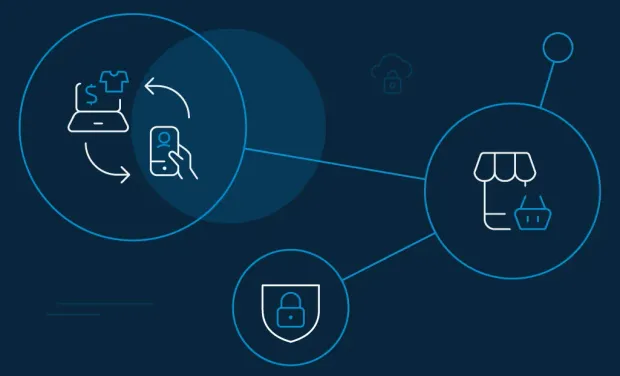E-commerce security is crucial in today’s dynamic digital landscape. As digital commerce expands, protecting online financial exchanges is essential. Implementing two-factor authentication (2FA), like 2FA for eBay, significantly bolsters security through an authenticator app. This piece discusses how 2FA solutions revolutionize e-commerce safety, securing transactions and building digital consumer confidence.
Why E-commerce Security Matters More Than Ever

Online retail constantly transforms. Its expansion heightens security risks, making robust protection crucial for business success. Criminals constantly adapt, focusing on weak areas like payment systems, login pages, and stored data. Breaches cause financial harm, tarnish reputations, and invite legal problems.
Businesses hold a vital duty to safeguard shopper info, including bank details, addresses, and contact info. Rising identity theft and account hacking underscore that basic passwords are insufficient.
Effective e-commerce protection requires multiple defenses. Educated users, safe coding, encryption, and multi-factor authentication build strong security. Multi-factor authentication, notably, is now vital for curbing fraud and unauthorized access.
The Rising Cost of Security Breaches
E-commerce platforms face enormous financial losses from security failures. Reports reveal data breaches can cost millions, encompassing penalties, recovery expenses, and lost customer confidence. Companies using multi-factor authentication see fewer breaches, demonstrating its value.
Breaches also severely damage brand reputations. Customers understand cybersecurity issues, so failing to secure their data undermines loyalty and revenue. Advanced security, such as 2FA Authenticator, is now essential.
Regulatory Compliance and Consumer Expectations
Regulatory frameworks such as GDPR, PCI DSS, and CCPA impose strict standards for data protection, compelling e-commerce businesses to ensure secure handling of customer data. Failure to meet these standards can result in hefty penalties and legal repercussions.
Simultaneously, consumer expectations are shifting. Buyers favor platforms that demonstrate a commitment to e-commerce security, often actively seeking verification assertions like two-factor authentication options. Implementing 2FA for eBay or similar marketplaces aligns with these expectations, helping to build loyalty and trust.
The Role of Technological Advances in Security
New technologies like biometrics, blockchain, and AI are enhancing online transaction security. Despite these advancements, 2FA apps are especially effective due to their ease of use. These apps offer an immediately accessible security boost that doesn’t make things complicated.
Amidst growing digital dangers, strong authenticator apps are essential. They provide crucial protection, reinforcing other security steps to build comprehensive defenses for online commerce.
The Growing Need for Enhanced E-commerce Protection

The landscape of online commerce is fraught with risks that have escalated in recent years. Cybercriminals are employing complex techniques such as phishing, malware, and credential stuffing to exploit vulnerabilities. This reality warrants a proactive approach towards e-commerce security, with a particular emphasis on multi-factor authentication.
E-commerce platforms are handling a vast array of transactions daily, often involving sensitive personal and financial data. The sheer volume and value of these transactions make them attractive targets, prompting a need for enhanced security measures that can prevent unauthorized access effectively.
Increasing Cyber Threats and Their Impacts
The number and sophistication of cyber threats targeting e-commerce transactions are continuously rising. Attackers often breach accounts to steal funds, reroute transactions, or hijack user profiles for identity theft. The repercussions are not limited to financial loss but extend to legal liabilities and reputational harm.
For example, a single successful breach can unravel trust built over years, potentially leading to customer churn and diminished sales. The societal impact of cybercrime also underscores the importance of securing digital transactions. Efforts like 2FA for eBay significantly reduce the likelihood of these threats succeeding.
The Limitations of Password-Only Security
Traditional password-based protection is increasingly deemed inadequate. Many users adopt weak passwords, reuse credentials across sites, or fall victim to phishing scams. These vulnerabilities enable cybercriminals to access accounts with relative ease.
Research indicates that relying solely on passwords is insufficient given the current threat landscape. Therefore, integrating additional security layers such as 2FA Authenticator becomes essential. This method ensures that even if passwords are compromised, unauthorized access remains highly improbable without the secondary verification.
Consumer Demand for Better Security
Modern consumers are more security-conscious than ever. They prefer platforms that offer straightforward yet effective measures to protect their data. 2FA for eBay and similar marketplaces have become significant selling points, often highlighted as a mark of trustworthy service.
Businesses adopting authenticator apps demonstrate a commitment to e-commerce security, which enhances customer confidence. This trust can translate into higher conversion rates and increased loyalty, especially as fraud prevention measures become more transparent and accessible.
The Cost-Effectiveness of Implementing 2FA
While implementing enhanced security measures incurs costs, the potential savings from avoiding data breaches are far greater. Utilizing 2FA Authenticator solutions is a cost-effective strategy that can prevent significant financial and reputational damage.
Moreover, the availability of free or inexpensive authenticator apps makes widespread adoption feasible for businesses of all sizes. This democratization of security tools levels the playing field, allowing smaller businesses to compete with larger firms in cybersecurity resilience.
Unlocking the Power of 2FA in E-commerce Transactions

Two-factor authentication (2FA) is a strong method for securing online payments. It verifies users with both a password and a second verification step, such as a device. This combined approach makes unauthorized entry much less likely. The adoption of 2FA applications in online stores offers simple, effective security, protecting both buyers and sellers from digital risks. Knowing how 2FA works highlights its importance in safeguarding today’s online commerce
How 2FA Adds a Layer of Security
2FA strengthens security by adding extra steps. Unlike passwords alone, 2FA uses a second authentication method. This can include codes that expire, unique biological markers, or physical devices.
This second factor significantly reduces the impact of compromised logins. Even if a password is stolen through hacking or phishing, getting the verification code remains extremely challenging without the second authentication method.
Types of 2FA Methods Used in E-commerce
There are various methods of implementing 2FA, each suited to different user preferences and security needs:
- Authenticator Apps: Apps like Google Authenticator, Authy, or Microsoft Authenticator generate time-based, one-time codes for verification.
- SMS-Based Verification: Sends a verification code via text message; however, this method is more vulnerable to interception and SIM swapping.
- Email Authentication: Sends a code or notification to the registered email address as a secondary verification step.
- Biometric Authentication: Uses fingerprint, facial recognition, or voice verification integrated into devices.
- Hardware Tokens: Physical devices such as YubiKey or RSA SecurID provide high security but are less common for everyday e-commerce transactions.
Among these, authenticator apps strike a balance between convenience and security, making them a preferred choice for many e-commerce platforms.
Implementing 2FA on Popular Platforms
E-commerce platforms such as eBay, Amazon, and Etsy have implemented two-factor authentication (2FA) for improved security. Users can often activate 2FA via authenticator apps or text messages to safeguard their accounts.
Setting up 2FA is generally a straightforward process. Following activation, users will be asked for a verification code during logins or purchases, which enhances overall security.
The Benefits of Using an Authenticator App for 2FA
Authenticator apps offer numerous advantages over other methods:
- Enhanced Security: They generate time-based, one-time codes that are difficult to intercept or duplicate.
- Offline Access: Since the codes are generated locally on a device, they do not require internet access, making them immune to online disruptions.
- Ease of Use: User-friendly interfaces facilitate quick setup and regular use.
- Cost-Effective: Most authenticator apps are free, removing financial barriers to robust security.
Additionally, authenticator apps eliminate the vulnerabilities associated with SMS-based verification such as SIM swapping or message interception.
Challenges and Considerations
Despite their advantages, 2FA authenticator solutions face challenges:
- Device Loss or Theft: Users might lose access to their verification app if they lose their device, making account recovery processes critical.
- User Resistance: Some users find extra steps inconvenient, leading to reluctance in adopting 2FA.
- Implementation Complexity: For businesses, integrating 2FA seamlessly into existing infrastructure requires planning and technical expertise.
Addressing these challenges involves providing clear instructions, backup options (like recovery codes), and emphasizing the security benefits to users.
Strengthening Your E-commerce Security with 2FA

Enhancing e-commerce security is a continuous process. Simply enabling 2FA is a significant step but should be part of a comprehensive security strategy that includes secure coding, encryption, and proper user education. The deployment of 2FA authenticator solutions acts as a potent tool in this security arsenal.
The Business Case for 2FA Implementation
Implementing two-factor authentication (2FA) offers tangible benefits by blocking unwanted entry. This practice can distinguish a company, showing a commitment to security and customer needs.
Besides deterring fraud, 2FA aids in meeting industry rules, minimizing potential penalties. Affordable and highly secure authenticator apps are advantageous for businesses of all sizes.
Developing Client Trust and Loyalty
Implementing safeguards like two-factor authentication on eBay and similar services boosts customer confidence. Demonstrating a commitment to security with readily available protections encourages purchases and repeat visits.
Further building trust involves transparently detailing security measures and providing simple instructions for enabling 2FA. Openness helps users feel secure and appreciated.
Best Practices for Implementing 2FA in E-commerce
Successful integration of 2FA requires adherence to best practices, including:
- Offering multiple options for secondary verification to cater to diverse user preferences.
- Providing easy-to-understand onboarding processes and help resources.
- Implementing backup options like recovery codes or email-based verification.
- Making 2FA optional initially, with a smooth pathway for users who choose to enable it.
- Regularly updating the security infrastructure to incorporate new threats and technological advances.
- Educating users about the importance of e-commerce security and best practices to prevent social engineering attacks.
Combining 2FA with Other Security Measures
While 2FA authenticator solutions significantly reduce risk, they should not operate in isolation. Combining 2FA with encryption, secure payment gateways, regular security audits, and attentive user management creates a multi-layered approach that is more resilient against cyber threats.
This layered security enables businesses to adapt to evolving threats effectively, ensuring continuous protection of customer data and financial transactions.
Conclusion
E-commerce security is crucial for businesses thriving in our digital world. Employing 2FA on eBay and similar sites using authenticator apps is an effective means of preventing unwanted access and safeguarding financial activities. Authenticator-based 2FA increases customer trust, helps meet regulations, and significantly decreases potential security incidents. Integrating this technology is vital for e-commerce ventures aiming for secure and lasting operations within the current online landscape.
What other security measures complement **2FA?
Encryption, secure payment processing, regular security audits, and user education are key complementary measures to enhance **e-commerce security further.
Are **authenticator apps free?
Yes, most **authenticator apps are free to download and use, making them accessible for businesses and individual users alike.
Can users still access accounts if they lose their device with the **authenticator app?
Yes, most **authenticator apps provide backup options such as recovery codes or cloud backups, allowing users to regain access without compromising security.
Is enabling **2FA for eBay complicated?
No, most platforms, including eBay, offer user-friendly guided processes to enable **2FA, typically involving scanning a QR code with an authenticator app and entering verification codes.
How does 2FA improve **e-commerce security?
**2FA adds a second verification step beyond passwords, making unauthorized access significantly more difficult even if login credentials are compromised. This extra layer protects accounts from hacking and fraud.
What is a 2FA Authenticator app?
An authenticator app is a mobile application that generates time-based, one-time verification codes used as a second factor in two-factor authentication. Popular apps include Google Authenticator, Authy, and Microsoft Authenticator.



